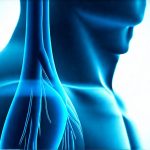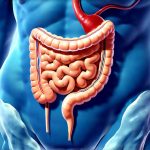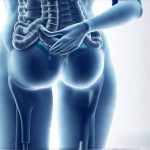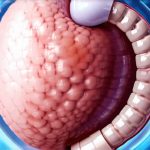The experience of unexplained digestive cramping is frustratingly common, impacting quality of life for millions yet often proving difficult to diagnose definitively. Traditional investigations frequently come back normal, leaving individuals feeling dismissed and searching for answers. While gastrointestinal issues are often attributed to dietary factors, stress, or inflammatory bowel disease, there’s a growing body of research suggesting a more nuanced connection – one that extends beyond the gut itself and delves into the intricate world of neurochemistry. This exploration isn’t about disregarding established medical knowledge; rather, it proposes an expansion of our understanding, acknowledging the significant role brain-gut interactions play in chronic digestive discomfort. Understanding the connection between stress can be a crucial first step for many experiencing these issues.
The conventional focus on physical manifestations within the digestive tract often overlooks the powerful influence of the nervous system and its chemical messengers. Neurotransmitters – those vital compounds that facilitate communication between nerve cells – are not confined to the brain; they’re actively present throughout the entire gut, forming a complex bidirectional network known as the gut-brain axis. Disruptions in neurotransmitter balance can profoundly impact gastrointestinal motility (the movement of food through the digestive system), visceral sensitivity (how we perceive pain and discomfort in the gut), and even immune function within the digestive tract. Recognizing this interplay is key to understanding why symptoms persist despite negative test results for conventional GI conditions, and opens possibilities for novel approaches to management.
The Gut-Brain Axis: A Two-Way Street
The gut-brain axis isn’t a one-way street; it’s a dynamic communication system where the brain influences the gut, and the gut influences the brain. This reciprocal relationship is mediated by several pathways including the vagus nerve – a major cranial nerve directly connecting the brainstem to many internal organs, including the digestive tract – the enteric nervous system (often called the “second brain” due to its complexity), the hypothalamic-pituitary-adrenal (HPA) axis which responds to stress, and crucially, the microbiome—the trillions of bacteria residing in our gut. An imbalance in any of these components can disrupt the entire system, leading to a cascade of physiological changes that contribute to digestive symptoms. Considering gut dysbiosis as a potential cause is becoming more common in functional medicine.
Specifically regarding neurotransmitters, serotonin – often associated with mood regulation – is largely produced in the gut (around 90% of the body’s supply). Dopamine, crucial for motivation and reward, also has significant presence within the digestive system, impacting motility and digestion. GABA, an inhibitory neurotransmitter that promotes relaxation, plays a role in reducing intestinal hypersensitivity. When levels of these key neurochemicals are disrupted – due to factors like chronic stress, poor diet, genetic predispositions or even subtle nutritional deficiencies—the gut’s normal function can become compromised, manifesting as cramping, bloating, and altered bowel habits.
Furthermore, the microbiome profoundly influences neurotransmitter production. Certain bacterial species directly synthesize neurotransmitters or modulate their levels in the gut. An imbalance in the microbiome – known as dysbiosis – can therefore indirectly impact neurochemical balance and contribute to digestive symptoms. This creates a complex feedback loop where imbalances in one area perpetuate problems in another. The relationship between gut imbalance and food sensitivities is also worth exploring.
Neurotransmitter Imbalance & Digestive Cramping: Specific Pathways
The link between specific neurotransmitter imbalances and cramping isn’t always straightforward, but research is beginning to shed light on some key connections. For instance, low levels of serotonin have been associated with increased visceral sensitivity – meaning individuals experience pain more intensely even from normal digestive processes. This can lead to a heightened perception of cramping and discomfort. Conversely, excessive dopamine activity in certain areas of the gut might contribute to hypermotility (increased muscle contractions) resulting in diarrhea and cramping.
GABA deficiency is also implicated in increased intestinal permeability (“leaky gut”), where the lining of the intestine becomes more porous, allowing undigested food particles and toxins to enter the bloodstream triggering inflammation and potentially exacerbating cramping. The HPA axis, activated during stress, releases cortisol which can disrupt gut motility and microbiome composition further contributing to neurotransmitter imbalances. This is why periods of high stress often coincide with flare-ups of digestive symptoms. It’s also important to note that genetic variations affecting neurotransmitter metabolism or receptor sensitivity can predispose individuals to these imbalances. Understanding the connection between gut health and emotional regulation is crucial, particularly in women.
The Role of Inflammation
Chronic inflammation plays a central role in many functional gastrointestinal disorders, and it’s inextricably linked to neurochemical imbalance. Inflammatory cytokines (signaling molecules released by the immune system) can directly affect neurotransmitter synthesis and function in the gut. For example, chronic inflammation can reduce serotonin production and impair GABAergic signaling leading to increased pain sensitivity and altered motility.
Inflammation also impacts the microbiome, creating a vicious cycle where dysbiosis exacerbates inflammation and vice versa. This interplay makes it difficult to disentangle cause and effect but highlights the importance of addressing both neurochemical imbalances and underlying inflammatory processes when managing chronic digestive cramping. Dietary interventions aimed at reducing inflammation—such as eliminating processed foods, increasing intake of omega-3 fatty acids, and incorporating probiotic-rich foods – can be beneficial in modulating both gut health and neurotransmitter balance.
Nutritional Deficiencies & Neurotransmitter Synthesis
Many essential nutrients serve as precursors to neurotransmitter synthesis meaning deficiencies can directly impact their production. For example, tryptophan is an amino acid required for serotonin production; deficiencies in B vitamins (particularly B6, folate, and B12) are also linked to reduced serotonin levels. Similarly, tyrosine – another amino acid – is needed for dopamine and norepinephrine synthesis.
Magnesium deficiency is common and can disrupt GABAergic signaling while contributing to muscle spasms which can worsen cramping. Iron deficiency, even without anemia, has been shown to affect neurotransmitter metabolism and gut motility. Identifying and addressing these nutritional deficiencies through diet or supplementation (under the guidance of a healthcare professional) may play a role in restoring neurochemical balance and alleviating digestive symptoms.
Personalized Approaches & Future Research
The complexity of the gut-brain axis necessitates personalized approaches to management. What works for one individual might not work for another due to variations in genetics, lifestyle, diet, and microbiome composition. A thorough assessment – including detailed dietary history, stress levels, sleep patterns, and potentially specialized testing such as stool analysis (to assess microbiome diversity) and organic acid testing (to evaluate neurotransmitter metabolites)—can help identify specific imbalances and guide treatment strategies. The relationship between digestive bacteria and long term energy metabolism is also important to consider in overall health. Recognizing the gut bacteria connection to food related anxiety can help tailor treatment plans.
Future research is crucial to further unravel the intricate connections between neurochemical imbalance and unexplained digestive cramping. Investigating the role of specific microbial strains in neurotransmitter production, exploring novel therapies that target gut-brain communication pathways, and developing more personalized nutritional interventions are all areas ripe for exploration. Ultimately, a holistic approach that addresses both the physical and neurological aspects of digestive health offers the most promising path towards lasting relief.


















